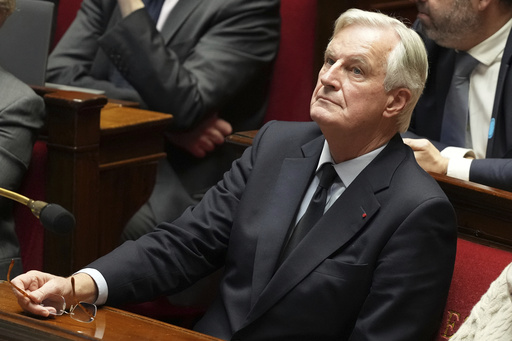
PARIS — In a significant political shift, France’s far-right and left-wing factions are poised to collaborate on Wednesday in an unprecedented no-confidence vote aimed at removing Prime Minister Michel Barnier’s government. This development, ignited by ongoing budget disagreements, could result in the first instance of a French government being ousted through such a motion in over six decades.
President Emmanuel Macron has asserted his intention to complete his term until 2027, despite increasing demands for his resignation amidst rising turmoil. Nevertheless, this situation would compel Macron to appoint a new prime minister for the second time this year, further altering the political landscape following his party’s setbacks during the legislative elections in July.
As Macron currently undertakes a presidential visit to Saudi Arabia, he has downplayed fears of potential government collapse, with French media reporting his dismissal of discussions regarding his exit from office as mere “make-believe politics.” He emphasized his electoral legitimacy, declaring, “I’m here because I’ve been elected twice by the French people,” and encouraged calm by stating, “We must not scare people with such things. We have a strong economy.”
The no-confidence motion stems from intense backlash against Barnier’s budget proposal. The National Assembly, which represents the lower house of the French parliament, is notably divided, lacking a majority from any single party. It consists of three prominent groups: Macron’s centrist allies, the left-wing coalition known as the New Popular Front, and the far-right National Rally (RN). In an unusual alignment, the two opposition blocks, often divided, are joining forces against Barnier, condemning him for enforcing austerity measures and neglecting the needs of the populace.
On Tuesday morning, National Rally leader Jordan Bardella — whose party previously played a vital role in sustaining Barnier’s position — expressed support for the no-confidence motion, describing the budget as “flawed and harmful” to the French public. Leaders on the left have echoed these sentiments, advocating for increased social expenditure.
For the no-confidence motion to succeed, a minimum of 288 votes out of 574 is required in the National Assembly. Both the left and far right claim to have more than 330 lawmakers on their side; however, some members may choose to abstain from voting.
If Barnier’s government fails to survive the vote, Macron would face the task of appointing a new prime minister, although the fragmented structure of parliament would remain intact. Legislative elections cannot occur until at least July, raising concerns about potential political gridlock for decision-makers.
While France is not facing a scenario akin to a U.S.-style government shutdown, the emerging political instability may unsettle financial markets. Barnier has cautioned that rejecting his budget bill could lead to “a big storm and very serious turbulence on the financial markets.”
The European Union continues to press France to address its substantial national debt. This year’s deficit is projected to reach 6% of the gross domestic product, with forecasts suggesting it could escalate to 7% next year unless significant reforms are instituted. Such political instability may further increase French interest rates, exacerbating the country’s debt situation.
